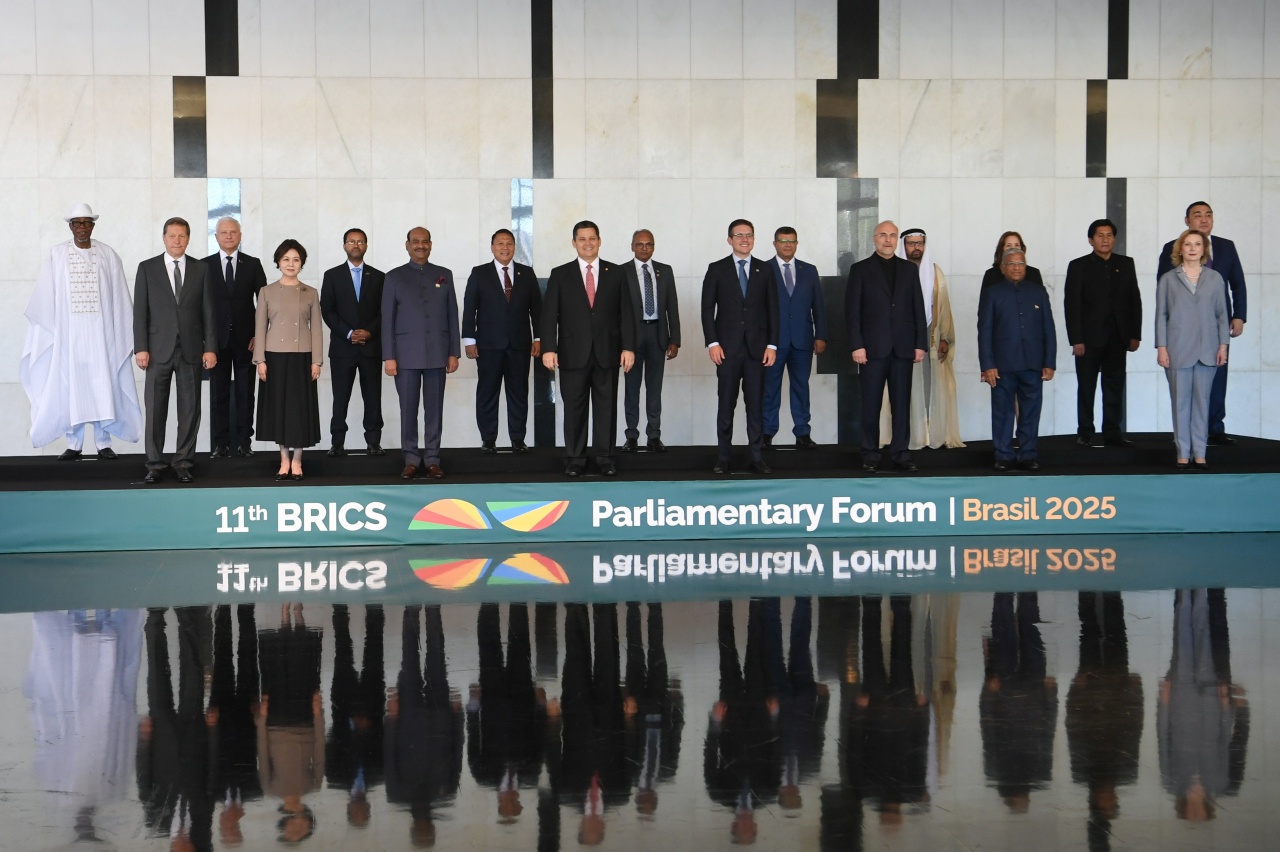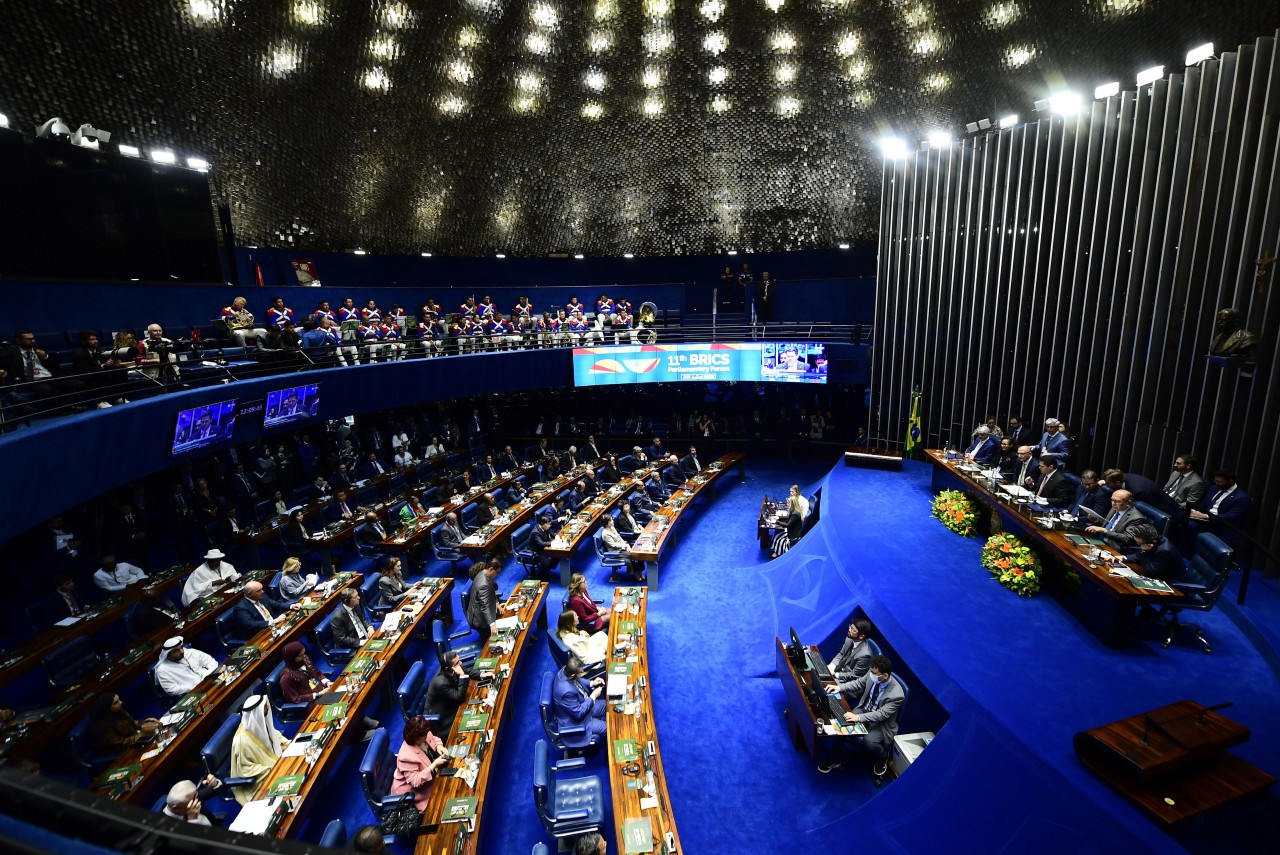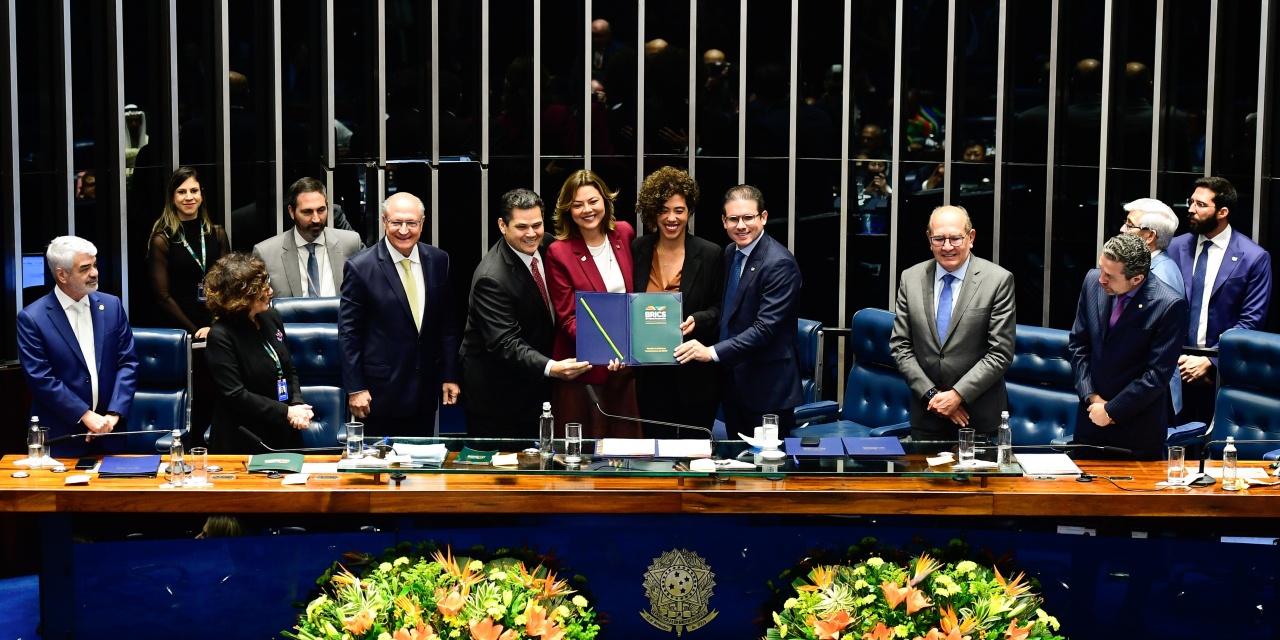The BRICS Parliamentary Forum advocates for a new global order with enhanced leadership from the Global South
Representatives of BRICS countries will conclude the 11th Parliamentary Forum on Thursday, June 5, with the signing of a joint declaration advocating for a more inclusive global order. The document, which has been under negotiation since April, is expected to reflect key discussions, including United Nations reform, the use of local currencies in transactions, and increased women's participation in political decision-making

Representatives of the National Congress emphasized during the opening of the 11th BRICS Parliamentary Forum in Brasília the urgency of enhancing cooperation among Global South countries and strengthening the sovereignty of emerging nations in response to current geopolitical challenges. The ceremony gathered parliamentarians from 16 countries, including permanent members of the group—Brasil, Russia, India, China, and South Africa—as well as nations such as Indonesia, Iran, the United Arab Emirates, Nigeria, Ethiopia, Cuba, Bolivia, and Egypt.
Parliamentarians reaffirmed BRICS' long-standing priorities, including the reform of multilateral organizations to enhance the representation of Africa, Asia, and Latin America, as well as promoting trade transactions in local currencies among member countries. Senator and President of the Senate, Davi Alcolumbre, in his opening address at the 11th BRICS Parliamentary Forum, underscored the group's strategic importance, noting that it accounts for 40% of global GDP and 25% of international trade. "We are diverse, yet united by social justice and sustainable development," he stated, emphasizing that BRICS has already surpassed the G7 in economic power. The senator highlighted key priorities for the forum, including the reform of the multilateral security architecture, the strengthening of public health systems, and the regulation of artificial intelligence. "We need regulations that include and protect people in this new technological era," he argued.
Alcolumbre underscored the need to align economic growth with sustainability, stating, "There can be no genuine development without a long-term vision." The senator also highlighted two symbolic achievements of the Forum—the expansion of the group with new member countries and the active participation of women parliamentarians, with their own dedicated space for discussions. "Society becomes stronger when it integrates woman’s perspective into political decision-making," he affirmed.
Alcolumbre urged parliamentarians to translate social demands into concrete public policies, stating, "This is a time of hope, where we can collectively build a fairer future.

Acting President Geraldo Alckmin participated in the event. He outlined six priorities for Brasil's BRICS presidency in 2025, including the establishment of pandemic response mechanisms—such as a global vaccine fund—and the promotion of payment systems in local currencies to reduce trade costs. "The BRICS Development Bank has already financed $32 billion in infrastructure and clean energy projects. We must strengthen this cooperation," he emphasized.
The Acting President underscored the importance of global health, emphasizing the need for cooperation in response to health crises — such as the five major epidemics of the past 17 years (SARS, H1N1, MERS, Ebola, and COVID-19). "Today's challenges require strengthened parliaments and collective action," he stated, noting that Brasil positions itself as a bridge between nations, advocating that "true progress emerges from what unites us." Alckmin concluded his speech with a quote from President Luiz Inácio Lula da Silva: "The only viable future is one that is sustainable, just, and shared."
Senator Humberto Costa (PT-PE), coordinator of the Forum in the Senate, criticized the structure of the United Nations for reflecting "outdated scenarios from the 1950s." "These systems fail to acknowledge the emergence of new actors in global politics. The organization of Global South countries has reshaped traditional geopolitics, yet institutions remain anchored to a centralized Western perspective," Costa stated.
His remarks echoed the statement of the President of the Chamber of Deputies, Hugo Motta, who advocated for the reform of the United Nations Security Council and the World Trade Organization (WTO) to establish "fairer rules, particularly for agriculture and food security." Motta underscored the urgent need to reform multilateral institutions to reflect the contemporary global landscape. "The structures of the United Nations still mirror the geopolitical realities of the post-World War II era, disregarding the growing role of the Global South," he stated, calling for changes in the Security Council and WTO to ensure greater representation for developing countries.
The President of the Chamber of Deputies outlined six priority areas for the Forum: global health, trade, climate change, artificial intelligence governance, international security, and the institutional strengthening of BRICS. The parliamentarian underscored the role of the New Development Bank (NDB), which has already financed sustainable projects, and proposed expanding the use of local currencies in trade transactions. "We must reduce costs and non-tariff barriers to foster trade among our countries," he stated.
Women discuss increased participation in the BRICS political agenda
Hugo Motta welcomed the prior convening of the BRICS Women's Meeting and reaffirmed the commitment to gender equality. "Parliamentary diplomacy plays a crucial role in translating decisions into concrete policies," he concluded, calling on legislators to build "a more just and sustainable world" through collective action.

Senator Leila Barros, leader of the Women's Caucus in the Senate, highlighted the critical challenges discussed in the women's panel at the 11th BRICS Parliamentary Forum, focusing on the impacts of artificial intelligence, climate change, and food insecurity on women. "Women, particularly those experiencing poverty, Black women, and young women, are the most vulnerable in these crises," she emphasized. The senator underscored the need for dedicated resources within the BRICS Bank to support programs in education, entrepreneurship, and women's digital inclusion. "We need a budget specifically allocated to women," she advocated, calling for increased female representation in decision-making forums. "It is unacceptable that, in the 21st century, we still have to fight for space," she stated, proposing that BRICS women's meetings be held annually to ensure continuity in discussions.
Justice Gilmar Mendes, of the Supreme Federal Court (STF), underscored the strategic significance of BRICS, which convened representatives from the Executive, Legislative, and Judiciary branches. He emphasized legal cooperation among member states, referencing agreements between the STF and China on artificial intelligence and anti-discrimination measures. "Just as our courts cooperate, our parliaments must strengthen this dialogue," he asserted, reaffirming the group's role as an alternative to the traditional financial order. The minister further highlighted the urgency of advancing discussions on global health, climate, and AI governance to foster "a more equitable global order."
The 11th BRICS Parliamentary Forum, which commenced on Tuesday, June 3, will continue until Thursday, June 5, featuring discussions aimed at producing a document with joint legislative proposals from participating countries.